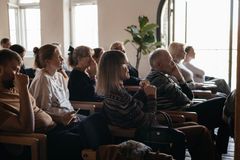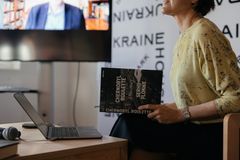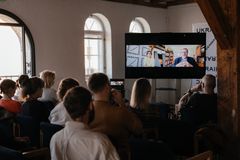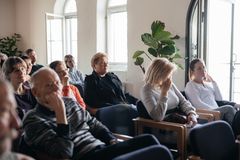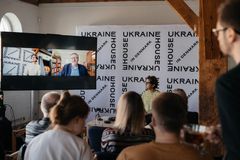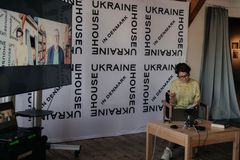Ukraine House in Denmark Hosts Chornobyl Legacy Discussion with Professor Serhii Plokhy
On Sunday, April 27, Ukraine House in Denmark had the honour of hosting a discussion dedicated to the legacy and present-day relevance of the Chornobyl disaster. We were privileged to welcome Professor Serhii Plokhii, Director of the Ukrainian Research Institute at Harvard University and a globally recognized authority on nuclear catastrophes. Professor Plokhii, who joined us at the opening of Ukraine House, opened by reminding us that “authoritarian regimes are there to create disasters—small disasters and big disasters—and Chornobyl is about a big disaster that can destroy life on Earth.” He went on to draw a chilling parallel between 1986 and 2022: “The most disturbing part of that new Chornobyl crisis that emerged in 2022 was that it was caused by the very same phenomenon—the authoritarian regime that has complete disregard for norms of international law, for human life, for environmental concerns.”
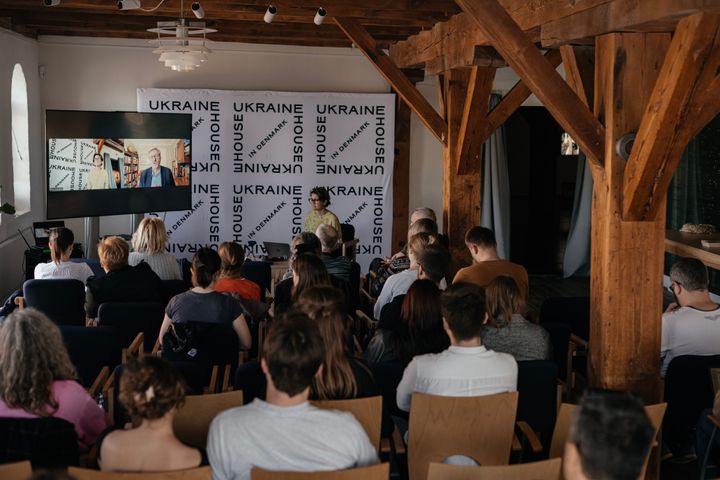
The discussion centred on two of Professor Plokhii’s pivotal works, “Chernobyl: The History of a Nuclear Catastrophe” and “Chernobyl Roulette: War in the Nuclear Disaster Zone”, the latter chronicling the occupation of the Exclusion Zone during Russia’s full-scale invasion in 2022. He underscored how the radioactive threat transcends borders: “The radiation didn’t recognize the Iron Curtain, NATO, or borders. It’s still there. This is a challenge to Europe. We all need to be united to protect each other from authoritarian regimes and nuclear weapons. At stake is really the survival of the entire subcontinent.” He warned that we must learn from those failures of solidarity in 1986 to avoid repeating them now.
Highlighting the courage of Ukrainian personnel at both Zaporizhzhia and Chornobyl, Professor Plokhii shared the remarkable story of shift supervisor Valentin Heiko. A veteran liquidator from 1986, Heiko stood his ground under Russian occupation and declared to the occupiers: “I have enough knowledge and I have enough determination. We have nothing to lose—you will never leave the station and you will die here.” “We were lucky to have people in 2022 that were there,” Plokhii added, noting that their technical skills and moral decisions averted a second catastrophe. In a quieter form of defiance, Lyudmila Kozak—one of the few women on site—refused to wear the occupiers’ white armband and instead embroidered a Ukrainian trident on her cap, silently declaring that she will never surrender.
Professor Plokhii also reflected on the broader societal resilience born from Chornobyl 1986: “The spirit of contemporary Ukraine was born. Ukrainians decided to react to Chornobyl in that particular way — not by accepting the lies, but by demanding truth and dignity.” He contrasted this with the conduct of the occupying forces, pointing out that “the Russian military commanders have complete disregard for the life of their own people,” citing chilling examples such as trench-digging in the highly contaminated Red Forest by uninformed conscripts.
Concluding the discussion, Professor Plokhii delivered a stark geopolitical warning and a note of hope: “The dangers that were there in 1986, and again in 2022, are still with us in 2025. The Russian Federation is still very imperial but sooner or later it will go through the process of disintegration. If Ukraine defeats the empire, it will be an encouragement to change Russia—creating a real federation rather than an authoritarian façade.” Such a triumph would not only embolden democratic forces across the region but also restore global confidence that, through transparency and accountability, nuclear energy can finally be made safe for humanity.
Ukraine House in Denmark extends its deepest gratitude to Professor Serhii Plokhii for his profound contribution to preserving historical memory and strengthening public understanding of the ongoing risks posed by nuclear threats by the Russian authoritarian regime.
Keywords
Images
About Ukraine House
The Ukraine House in Denmark is a civil society organisation of Ukrainian cultural diplomacy based in Copenhagen. Its mission is to form an enduring positive influence of Ukraine on Ukrainian-Danish cooperation, security, and lasting peace in Europe.
Subscribe to releases from Ukraine House in Denmark
Subscribe to all the latest releases from Ukraine House in Denmark by registering your e-mail address below. You can unsubscribe at any time.
Latest releases from Ukraine House in Denmark
Post-Release: Myroslav Marynovych om mod, samvittighed og konfrontationen med nutidens Rusland6.10.2025 10:45:03 CEST | Pressemeddelelse
København, Danmark – Den 5. september havde Ukraine House i Danmark den ære at være vært forMyroslav Marynovych, en vigtig dissident, medstifter af den Ukrainske Helsingforsgruppe, Gulag-overlever og prorektor ved det Ukrainske Katolske Universitet. Arrangementet kastede lys over modet hos Ukraines menneskerettighedsforkæmpere i 1960’erne og 70’erne – en generation, der modsatte sig den sovjetiske totalitære maskine, på et tidspunkt hvor næsten ingen troede, det var muligt.
Ukraine House in Denmark Hosts Debate on the End of Russian Colonialism1.10.2025 08:00:00 CEST | Pressemeddelelse
Copenhagen, September 22, 2025 — Ukraine House in Denmark, together with the Danish Foreign Policy Society and the Free Nations of Post-Russia Forum, convened a high-level discussion on the end of Russian colonialism. The event brought together international experts, policymakers, and civil society leaders to examine Russia’s imperial decline and the urgent need to prepare for its consequences. Moderated by Nataliia Popovych, Chairperson of Ukraine House in Denmark, the panel featured Charlotte Flindt Pedersen (Danish Foreign Policy Society), Jacob Kaarsbo (Intelligence and Security Analyst), Juraj Mesík (Slovak Foreign Policy Association), Yaroslav Yurchyshyn (Member of the Ukrainian Parliament), Oleg Magaletskyi (Free Nations of Post-Russia Forum), and Mette Skak (Scholar on Russian foreign and security policy).
Post-Release: Myroslav Marynovych on Courage, Conscience, and Confronting Today’s Russia30.9.2025 14:09:02 CEST | Pressemeddelelse
Copenhagen, Denmark – On 5 September, Ukraine House in Denmark was honored to host Myroslav Marynovych, a keystone dissident, co-founder of the Ukrainian Helsinki Group, Gulag survivor, and Vice-Rector of the Ukrainian Catholic University. The event shone a light on the courage of Ukraine’s human rights defenders in the 1960s and 70s, a generation that resisted the Soviet totalitarian machine when almost no one believed it was possible.
How Ukraine’s Da Vinci Wolves Are Rewriting the Rules of War: Military Tech Discussion at Ukraine House in Denmark9.9.2025 08:00:00 CEST | Pressemeddelelse
Copenhagen, Denmark — August 22, 2025. At Ukraine House in Denmark, soldiers, engineers, and policymakers gathered to share the lessons of a war where milltech drones and robots, and artificial intelligence have moved from theory to daily reality in Ukraine. Organized by the Defence Robotics, a charity foundation, the discussion brought together Oleksandr Yabchanka, Head of the Robotic Systems Service of the Da Vinci Wolves battalion, alongside innovators from companies Frontline and Tencore, two of Ukraine’s leading developers of ground robotic platforms.
Ukraine House in Denmark Opens “Uncurtained: Ukrainian Art in Danish Collections 1989–2023”1.9.2025 08:00:00 CEST | Nyhed
Copenhagen, August 21, 2025 – Ukraine House in Denmark proudly opened “Uncurtained: Ukrainian Art in Danish Collections 1989–2023”, its 11th major exhibition and a landmark research project tracing 35 years of cultural exchange between Denmark and Ukraine. Curated by Kateryna Stukalova, the exhibition brings together over 100 works by 28 Ukrainian artists. In her opening remarks Nataliia Popovych, chairperson of Ukraine House in Denmark, emphasized: “Uncurtained is not just an exhibition — it is a journey through thirty-five years of trust, of Ukrainian art being seen, collected, and preserved in Denmark. Long before the world spoke of the ‘Danish model’ of support for Ukraine, Danish curators, collectors, and institutions chose to trust in Ukrainian creativity — to see our culture as sovereign and distinct. Opening on the eve of Ukraine’s Independence Day, this exhibition stands as a tribute not only to our artists, but to the very idea of independence — a daily choice to defend cultu
In our pressroom you can read all our latest releases, find our press contacts, images, documents and other relevant information about us.
Visit our pressroom
